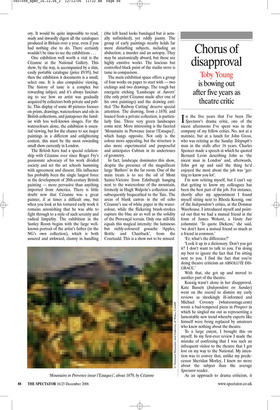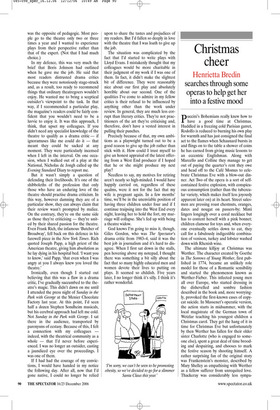Chorus of disapproval
Toby Young is bowing out after five years as theatre critic
In the five years that I’ve been The Spectator’s drama critic, one of the nicest afternoons I’ve spent was in the company of my fellow critics. No, not at a matinée, but at a lunch for John Gross, who was retiring as the Sunday Telegraph’s man in the stalls after 16 years. Charles Spencer made a speech in which he quoted Bernard Levin describing John as ‘the nicest man in London’ and, afterwards, John got up and said the thing he’d enjoyed the most about the job was ‘getting to know you lot’.
I’m now retiring myself, but I can’t say that getting to know my colleagues has been the best part of the job. For instance, shortly after my appointment I found myself sitting next to Rhoda Koenig, one of the Independent’s critics, at the Donmar Warehouse. I introduced myself and pointed out that we had a mutual friend in the form of James Wolcott, a Vanity Fair columnist. ‘To quote Dickens,’ she said, ‘we don’t have a mutual friend so much as a friend in common.’ ‘Er, what’s the difference?’ ‘Look it up in a dictionary. Don’t you get it? I don’t want to talk to you. I’m doing my best to ignore the fact that I’m sitting next to you. I find the fact that you’re doing theatre criticism an ABSOLUTE DISGRACE.’ With that, she got up and moved to another part of the theatre.
Koenig wasn’t alone in her disapproval. Kate Bassett (Independent on Sunday) went on the record to dismiss my early reviews as shockingly ill-informed and Michael Coveney (whatsonstage.com) wrote a bad-tempered piece in Prospect in which he singled me out as representing a lamentable new trend whereby experts like himself were being replaced by amateurs who knew nothing about the theatre.
To a large extent, I brought this on myself. In my first-ever review I made the mistake of confessing that I was such an infrequent visitor to the theatre that I got lost on my way to the National. My intention was to convey that, unlike my predecessor Sheridan Morley, I knew no more about the subject than the average Spectator reader.
As an approach to drama criticism, it was the opposite of pedagogic. Most people go to the theatre only two or three times a year and I wanted to experience plays from their perspective rather than that of the expert. (Not that I had much choice.) In my defence, this was very much the brief that Boris Johnson had outlined when he gave me the job. He said that most readers distrusted drama critics because they were notoriously stage-struck and, as a result, too ready to recommend things that ordinary theatregoers wouldn’t enjoy. He wanted me to bring a sceptical outsider’s viewpoint to the task. In that way, if I recommended a particular play, the magazine’s readers could be fairly confident that you wouldn’t need to be a luvvie to enjoy it. It was this approach, I think, that upset my colleagues. If you didn’t need any specialist knowledge of the theatre to qualify as a drama critic — if ignoramuses like me could do it — that meant they could be sacked at any moment. They were particularly incensed when I left in the interval. On one occasion, when I walked out of a play at the National, Nicholas de Jongh called up the Evening Standard Diary to report me.
But it wasn’t simply a question of defending their livelihoods. It’s one of the shibboleths of the profession that only those who have an enduring love of the theatre should practise drama criticism. In this way, however damning they are of a particular show, they can always claim that their review wasn’t prompted by malice. On the contrary, they’re on the same side as those they’re criticising — they’re united by their shared passion for the theatre. Even Frank Rich, the infamous ‘Butcher of Broadway’, fell back on this defence in his farewell piece in the New York Times. Rich quoted Joseph Papp, a high priest of the American theatre, giving him absolution as he lay dying in his hospital bed. ‘I want you to know,’ said Papp, ‘that even when I was angry at you I always knew you loved the theatre.’ Ironically, even though I started out believing that this was a flaw in a drama critic, I’ve gradually succumbed to the theatre’s magic. This didn’t dawn on me until I attended the press night of Sunday in the Park with George at the Menier Chocolate Factory last year. At this point, I’d seen half a dozen Stephen Sondheim musicals, but his cerebral approach had left me cold. Not Sunday in the Park with George. I sat there in the audience, transported by paroxysms of ecstasy. Because of this, I felt a connection with my colleagues indeed, with the theatrical community as a whole — that I’d never before experienced. I was no longer an outsider, casting a jaundiced eye over the proceedings. I was one of them.
If I had had the courage of my convictions, I would have handed in my notice the following day. After all, now that I’d gone native, I could no longer be relied upon to share the tastes and prejudices of my readers. But I’d fallen so deeply in love with the theatre that I was loath to give up the job.
The situation was complicated by the fact that I’d started to write plays with Lloyd Evans. I mistakenly thought that my colleagues would be more charitable in their judgment of my work if I was one of them. In fact, it didn’t make the slightest bit of difference. They were reasonably nice about our first play and absolutely horrible about our second. One of the qualities I’ve come to admire in my fellow critics is their refusal to be influenced by anything other than the work under review. In general, they are much less corrupt than literary critics. They’re not practitioners of the art they’re criticising and, therefore, don’t have a vested interest in pulling their punches.
Precisely because of that, my own ambitions as a playwright turned out to be a good reason to give up the job rather than stick with it. How could I trust myself to give an honest appraisal of the latest offering from a West End producer if I hoped that he or she might produce my next play?
Needless to say, my motives for retiring aren’t nearly so high-minded. I would have happily carried on, regardless of these qualms, were it not for the fact that my wife is pregnant again. In a few months’ time, we’ll be in the unenviable position of having three children under four and if I continue traipsing into the West End every night, leaving her to hold the fort, my marriage will collapse. She’s fed up with being a theatre widow.
God knows I’m going to miss it, though. Giles Gordon, who was The Spectator’s drama critic from 1983–4, said it was the best job in journalism and it’s hard to disagree. When I first sat down in the stalls, pen hovering above my notepad, I thought there was something a bit silly about the fact that so many highly educated men and women devote their lives to putting on plays. It seemed so childish. Five years later, I no longer think it’s silly. I think it’s rather wonderful.







































































































































 Previous page
Previous page